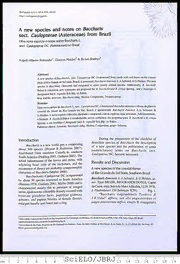
A new species and notes on Baccharis sect. Caulopterae (Asteraceae) from Brazil / Uma nova espécie e notas sobre Baccharis L. sect. Caulopterae DC. (Asteraceae) no Brasil PDF
Preview A new species and notes on Baccharis sect. Caulopterae (Asteraceae) from Brazil / Uma nova espécie e notas sobre Baccharis L. sect. Caulopterae DC. (Asteraceae) no Brasil
. Rodríguésia61(1):073-076.2010 http://rodriguesia.jbrj.gov.br A new species and notes on Bacchãrís sect. Caulopterae (Asteraceae) from Brazil UmanovaespécieenotassobreBaccharisL sect. CaulopteraeDC. (Asteraceae)noBrasil & AngeloAlbertoSchneider1 GustavoHeiden IlsiIobBoldríni , Abstract AnewspeciesofBaccharisL.sect. CaulopteraeDC.(Asteraceae)fromsandysoilsanddunesontheCoastal plainofRioGrandedoSulState,Brazil,ispresented:BaccharisdunensisA.A.Schneid.&G.Heiden.Thenew species is described, illustrated and compared to more closely related species. Additionally, B. burchelli Bakerisreinstated, newsynonyms areproposedfor B. burchelliiandB. crispa Spreng., anda lectotype is designatedforB. regnelliiSch.Bip.exBaker. Keywords:Astereae, Baccharissubg.Molina,Compositae,Trimeragroup. Resumo UmanovaespéciedeBaccharisL.sect. CaulopteraeDC.(Asteraceae)dossolosarenososedunasdaplanície costeira do litoral do Rio Grande do Sul, Brasil, é apresentada: Baccharis dunensis A.A. Schneid. & GHeiden Anovaespécieédescrita,ilustradaecomparadacomasespéciesmaispróximas.Adicionalmente, obinômio B. burchelliBakerérestabelecido,novossinônimossãopropostospara B. burchelliie B. crispa Spreng.,eumlectótipoédesignadoparaB. regnelliiSch.Bip. exBaker. Palavras-chave: Astereae,Baccharissubg.Molina,Compositae, grupoTrimera. During the preparation of the checklist of Introduction Brazilian species of Baccharis the description aboutB3ac6c0hasrpiesciiessa(nNeewsowomrl&d gReonb.itsnscoonmp2r0i0s7i)n,g nofomaenncelwatsupreacliesnoatnedsthoenpubBlaicccathiaornisof sseocmte. distributed from Southern Canada to Southern Caulopterae DC. became necessary. SouthAmerica(Fielding2001;Giuliano2001).The tufted indumentum ofthe leaves and stems, with Results and Discussion adjoining basal cells of the trichomes, and the occurrenceofdioecyareprobablysynapomorphic AnewspeciesoftheCoastaldunes charactersofBaccharis(Miiller2006). ofRioGrandedoSulState,SouthernBrazil Baccharissect.Caulopterae DC.isrepresented & bc(hByaarraarbcootsueotri13z90e7d6s;mpGeaciiiunellsiyarndeosut2er0it0cot1e;pdMriteioslelSneocrue2t0ho0fA6)mweiarnngidecidas BndoaavcC.caThnyaoprae,i:senBdtRurAneeSNnoIsiLiv.saRAdI.oOAM.GaSrcRheAnAeNtilDdâ.nEdiDdOaG,.SH1U2eLJiVd:e.Cn1a,9p7sã8p,o. stems,epaleaceousclinanthiadenselycoveredwith J. Pfadenhauer250(holotypeICN!). Fig. 1 biseriate glandular hairs, papillose glabrous “Baccharis riograndensis Teodoro & achenes, and pappus bristles of female flowers J.E.Vidal” affinis, sed alis angustioribus et enlargedbasally andfusedinto aring. pappopluriseriatodiffert, similis B.triangularis 'UniversidadeFederaldoRioGrandedoSul,ProgramadePós-GraduaçãoemBotânica,Av.BentoGonçalves9500,91501-970,PortoAlegre,RS,Brasil. [email protected]@ufrgs.br 'UniversidadedeSãoPaulo,ProgramadePósGraduaçãoemBotânica,Depto.Botânica.InstitutodeBiociências,R.doMatão,Tv.14.321,05508-900,SãoPaulo,SP, Brasil,[email protected] SciELO/JBRJ cm 13 14 15 16 17 18 19 74 Schneider,A.A.,Heiden,G. &Boldríni,1.1. ü C (J W) Figure 1 -Baccharís dunensis A.A.Schneid. & G. Heiden-a. habit; b. staminate capitulum; c. staminate flower (pappusremoved);d.pistillatecapitulum;e.phyllariesofpistillatecapitulum; f.corollaandstyleofpistillateflower; g. cypsela. (a, d-gSchwacke283; b, cHeiden 1054). Rodriguésia 61(1): 073-076. 2010 SciELO/JBRJ cm 13 14 15 16 17 18 .. 75 Newspeciesandnoteson Baccharissect. Caulopterae Hauman loco habitato, habitu, caule anguste similar to B. riograndensis by the cylindrical- aalpaitcoa,libsuesdcoirnofnloarteisscaebnstcieantsipbiucsifdoirjfmeirt.etfoliis eblyotnhgeatsemdalfleemratlaellca(0p.it1u-l0a.,3bmuttiotiBs.ddiusnteinnsguiissahendd Subshrub, 0.1-0.3 m tall; branching 0.3-0.6mtoB. riograndensis),thenarrowwimngms sympodial, shoots erect orerectopatente, ending ofthe vegetative branches (0.1-2 ví. 2.5-7 in a capitulescence, green, resinous; stems 3- wide to B. riograndensis) and pappus several winged, wings to 0.1—2 mm wide, plane, green, seriate. attenuate near to the nodes, internodia 0.3-2 cm Baccharis dunensis is probably endemic long. Leaves squamiform, sessile, nearly to the Coastal plain ofthe State of Fio Grande tsorliiatnagruyl,ara,lo0.ng1—t0e.r7mixna0l.1s-p0ik.e7-mlimk.ebCraapnicthuelsa1se—s4siclem, dalooSnugl.thIet icsoarsetsatlripcltaeidn.toFslaonwdeyrisnogilsanadndfrduuitniensg long.Malecapitula5.5-7mmlong;flowers 10-25, specimens have beencollected fromJanuary to May. The conservation status was framed in involucre5-6 x2—4mm,campanulate;phyllaries imned4iaonr p5hyslelraireise,soburtoeardmloysltanpcheyolllaatrei,esinnobelromnogs,t VlisUtcBaa(tieigio)r—yVu(lInUerCaNbl2e0,0a9c)cboredcianugsetotIheUCspNecRieeds phyllaries lanceolate, all phyllaries with apex is known to less than 10 locations and these obtuse, margins yellow to light brown, broadly places are suffering intense anthropogenic scarious;corolla4—5mmlong,tube2—3mmlong, pressure resulting inloss ofareaanddeclineof lobes 1.5-2 mm long, coiled at maturity; style habitatquality, mainlyduetourbanexpansion, mm dunesremovalandbiologicalinvasionofcoastal slightlyexceedingthecorolla,4.5-6 long,the vegetationby exotic species such as Casuarina apexnearlyfullydividedintolanceolatebranches, dilatedtowardsapex,ovaryabortive,glabrousand L. andPinus L. mm reduced;pappusuniseriate,5-6 long,bristles NomenclaturalnotesonBaccharissect F1e5-m2a5l,eacpaipciatlullyab7r.o5a-d1e2nemdmanldosncga;rfcleolwyebrasrb1el0l-a3t0e,. CaulopteraefromBrazil involucre7-8 x1.5-2.5mm,cylindrical;phyllaries Baccharisburchellii BakerinMartius, Eichler& in4-6series,likethoseofmalecapitula;corolla5— Urban,Fl.bras.6(3):44. 1882.Type:BRAZIL.SÃO 6 mm long, filiform, short-ligulate, the ligule PAULO:“admarginesilvulaepropeMorumbi”, W.J. denticulate, glabrous; style 6.5-7.3 mm long, Burchell4471 (holotype K,photoICN!;isotypeP, cypselae 1.5—1.7 x0.2—0.4mm,nearlycylindric, photoICN!). epapillate; 10—12-ribbed, pappus pluriseriate to Baccharisregnelliivar.subalataHeeringin several seriate, 3.5-8 mm long, bristles 37-60, Usteri,Fl.SãoPaulo258. 1911.Type:BRAZIL.SÃO PAULO: 23.XI.1906,A. Usteri 70b(holotypenot persistent, basally fused. Material examined: RIO GRANDE DO SUL. found;isotype SP!), syn. nov. Mostardas, LagoadoPeixe, 21.11.1970,Ct, E. Vianaet Baker(1882)assignedBaccharisburchellii al. s.n. (ICN7531). Rio Grande, Ilhados Marinheiros, (ser. Caulopterae) and B. regnellii (ser. 29.11.1880, 9, C.A.W.Schwacke283(R); 25.V.2009,Cf, Oblongifoliae) in distinct series, based on the G.Heidenetal. 1053(HECT,ICN,JE,K,RB).SãoJosé presence/abscence of winged stems and leaf doNorte,1.1992,Ct,P. Tagliani77(HURG);10.IX.2008, shape. Barroso (1976) recognized the affinities TGLr.aHag.moaaSniddlovaeíPi,eriax2&e0,.PV.1IC5I..IX.CI2Ir0.e01s59p,8a6Bn,.sçI.,nr.gE(.aInDgCaNns.i1nl.5e7(8vI3wC0z)N3.81T5a(7vH8aA2rS9e))s.. Bb.etbwuerecnheltlhieiseasspaecsieysn,ohnoywmevoefrB.shreegcnoenllsiiidevraerd. Baccharis dttnensis is a small subshrub subalata Heering. In the current work, B. (0.1—0.3mtall),withbranchedandnarrowwinged burchellii was considered as a distinct species alatestems. Itis likelyto B. triangularisbecause and its name has been applied based on their both have similar habit and habitat and narrow studied types and recent collections. Baccharis winged stems. However, itcan bedistinguished burchellii is morphologically related to B. fromthelaterspeciesmainly duethe absenceof regnellii, but it can be distinguished mainly by a pseudoinvolucre ofreduced bractlike cuneate the winged stem and sessile leaves with entire leaves, crowded around the capitula, which are margins(vs.stemapterousandleaveswithpetiole apicallysolitaryonthefertilebranches. Itisalso andcrenulatemargins in B. regnellii). Rodriguésia 61(1):073-076.2010 ISciELO/JBRJ cm 13 14 15 16 17 18 19 . 76 Schneider,A.A.,Heiden,G.&Boldrini,/./. Bacchariscrispa Spreng.,Syst. veg. 3:466. 1826. Acknowledgements Molinacrispa (Spreng.)Less.,Linnaea6: 141. 1831. The authors are grateful to the herbaria Baccharis genistelloides var. crispa (Spreng.) m & curators, to the collectors of the studied B1a8k8e2r. PMianrgtriaues,aEiccrhilsepra (USrpbraenn,gF.l).bFra.sH..6H(e3l):lw4.1, specimens,toCAPESandCNPq-PROTAXforthe Candollea46: 217. 1993.Baccharisgenistelloides financial support of our studies, to João Iganci subsp. crispa (Spreng.) Joch.Müll., Syst. Bot. forpreparingtheillustration,toTarcisoFilgueiras Monogr.76: 198.2006.Type:Uruguay,Montevideo, for revision of the Latin diagnosis and to the 1821-1822,Cf,F.Sellowd397[M.I.B.736](holotype anonymous reviewers for contributions on the P,photoICN!;isotypesBR;G;G-DC;R!,W). improvementofthetext. Baccharis subcrispa Teodoro, Contr. Inst. Geobiol.8:39.1957.Type:BRAZIL.RIODEJANEIRO: References Pedrado Altar, A.C. Brade 15593 (holotypeRB!; Baker,J.G.1882.Compositae.111.Asteroideae,Inuloideae. isotypesICN!,JE!), syn.nov. In:Martius,C.F.P.von;Eichler,A.W.&Urban,I. Barroso(1976)consideredBaccharissubcrispa (ed.).Florabrasiliensis. München,Wien,Leipzig. as synonym ofB. opuntioides Mart. ex Baker, an Vol. 6. Pp. 1-442. endemicspeciestotheSerradoCaparaó(ES/MG). Barroso,G.M. 1976.Compositae,subtriboBaccharidinae However,basedon theanalysisoftheholotypeof Hoffman.EstudodasespéciesocorrentesnoBrasil. B. subcrispa,weascertainthisnameasconspecific Rodriguésia28:3-273. to B. crispa due its morphological congruence. Fielding,R.R.2001.Baccharis:agenusoftheAsteraceae new to Canada. Proceedings ofthe Nova Scotian BaccharisregnelliiSch.Bip. exBakerin Martius, InstituteofScience41: 214-215. Eichler&Urban,Fl.bras.6(3):74.1882.Type:BRAZ1L. Giuliano,D.A.2001.Classifícacióninfragenéricadelas MINASGERAIS: PoçosdeCaldas,9.IX.1867, ç, espécies argentinas de Baccharis (Asteraceae, Astereae).Darwiniana39: 131-154. A.F.Regnell11-155. (lectotypeR!,heredesignated; duplicates BR, photo ICN!; C, photo ICN!; US, IUCN.2009.IUCNRedlistofthreatenedspecies.Version photoICN!). 2009.1.Availablein<http://www.iucnredlist.org>. Accesson 15 November2009. Baker (1882) described Baccharis regnellii listingtwospecimens(RegnellII.155andGlaziou MülleArs,teJr.e2a0e0)6.inSyBsotleívmiaat,icisncolfuBdaicngchaanriosve(Crovmipeowsoiftateh-e 7718).DuringtherevisionofherbariumR,aduplicate genus. Systematic Botany Monographs 76:1-341. ofthegathering RegnellII.155(R)wasfound.This Nesom, G. & Robinson, H. [2006] 2007. XV. Tribe specimen is designated here as lectotype, due its Astereae Cass. In: Kadereit, J. W. & Jeffrey, C. congruency with the original description and by (eds.). The families and generaofvascularplants. representing a fertile branch with developed Kubitzki,K.(seriesed.).Floweringplants:Eudicots: capitulaandflowers. Asterales.Vol.VIII.Springer,Berlin.Pp.284-342. Artigorecebidoem 08/10/2009.Aceito para publicaçãoem 23/03/2010. Rodriguésia 61(1): 073-076. 2010 JSciELO/JBRJ cm 13 14 15 16 17 18 19 ..
